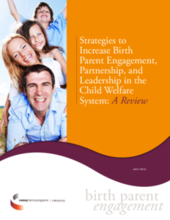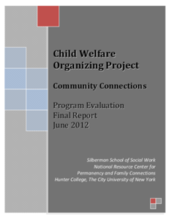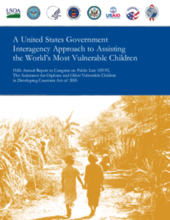This page contains documents and other resources related to children's care in the Americas. Browse resources by region, country, or category.
Displaying 3001 - 3010 of 3191
As an outgrowth of Casey’s ongoing work with birth parents, Research Services and Technical Assistance Unit collaborated to review strategies and programs that increase birth parent engagement with child welfare services and that develop effective child welfare partnerships with birth parents as mentors, leaders and advisers.
This article focuses on a central problem of foster care, which is that it is often not developmentally informed.
Helping families and their kin develop care plans for orphaned and vulnerable children was the objective of the family group conferencing (FGC) training that took place in Guatemala City from July 10-12, 2012. This family preservation approach for developing strategies to prevent the institutionalization of children emphasizes the strengths of families and their capacity to solve their own problems and develop their own care plans.
This article describes the results of a meta-analytic review aimed at providing an estimate of the prevalence of physical and emotional neglect by integrating prevalence figures from the body of research reporting on neglect. It discusses and makes recommendations on the dearth of studies investigating the prevalence of child neglect, despite evidence of its severe consequences on millions of children, and a global prevalence estimated to be above 15%.
This report from the Annie E. Casey Foundation assesses the practice of kinship care within the United States, reflecting upon the widespread use of this care practice, the complexities facing families involved in this form of care and the interventions and supports proven to assist in its success. While specific to the United States, discussions and recommendations can be assessed for application in other global settings.
The study is designed to identify whether effective caregiving mirrors strong parenting among typical parents or whether a set of additional skills is required to parent foster children responsively. Some of the principle features of quality caregiving for children are described particularly in the domains of family integration, relationships with biological parents, and support for children's special needs.
This evaluation study was conducted in an effort to learn more about the innovative parent organizing model implemented by the Child Welfare Organizing Project (CWOP) in East Harlem, New York City and identify the role and impact of CWOP community representatives on birthparents, families, and child safety conference outcomes.
The Fifth Annual Report to Congress on Public Law 109-95, The Assistance for Orphans and Other Vulnerable Children in Developing Countries Act of 2005 highlights continued efforts made by the U.S. Government to improve coordination on behalf of vulnerable children in the past year.
This comprehensive policy report by the Annie E. Casey Foundation summarizes what is known about kinship care in the United States, identifies the problems and issues these families face, and recommends how best to support caregivers as they step up to take responsibility for children in their extended families and communities.
This study used the National Survey of Child and Adolescent Well-being (NSCAW, long term foster care general sample) data set to examine foster child and caregiver characteristics, and the caregiver–child relationship as a predictor of placement stability.







